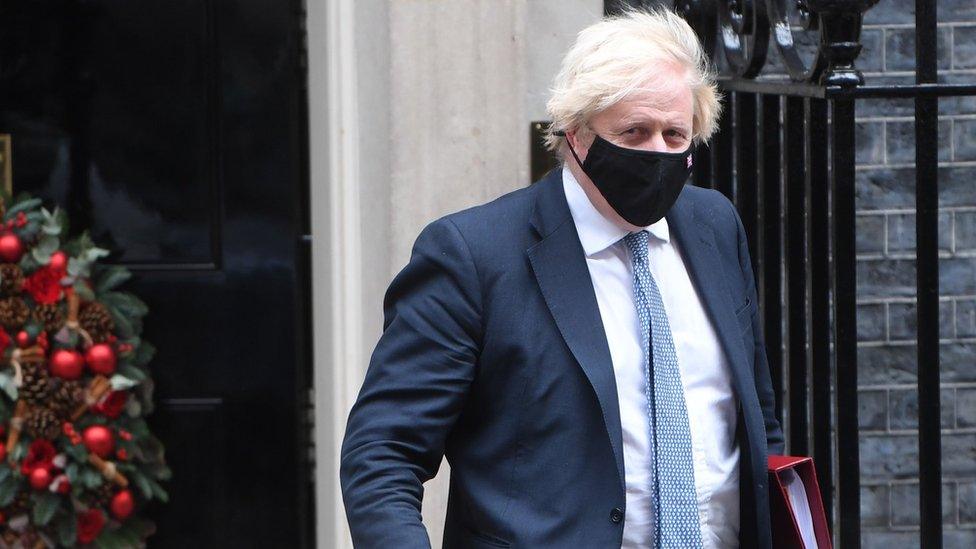Covid: Plan B vote to be split into three amid Tory rebellion
- Published

A vote to pass new Covid measures into law this week is expected to be split, as Boris Johnson faces a rebellion from about 70 Conservative MPs.
Government sources suggested the introduction of Plan B measures for England would be divided into three separate votes on Tuesday.
There will be a distinct vote for plans to introduce Covid passes in some venues, opposed by some Tories.
But Plan B is expected to become law as Labour is backing the government.
Ahead of the vote, Mr Johnson appealed to backbench rebels to recognise there was "no room for complacency" when it came to the Omicron variant.
He said he hoped "colleagues in Westminster...will also see that the measures we're putting in place are balanced and proportionate".
The BBC estimates that about 70 Tory MPs have said they will oppose the introduction of Covid passes - requiring proof of double jab or negative test - to access certain venues like nightclubs.
If replicated in the Commons on Tuesday, it would be the largest rebellion of his MPs that Mr Johnson has seen yet.
As a result, it is expected MPs will be asked to vote on this separately to other parts of the plan.
There is likely to be one vote on the new facemask rules.
Another vote is likely on whether a daily negative test result should allow those exposed to a positive case to avoid self-isolation.
And a third vote is expected on Covid status certification, described by some as vaccine passports, but which can be obtained through a negative lateral flow test.
Conservative MP Stephen Crabb told the BBC's Politics Live programme it would be "very, very difficult" for him to vote for Covid passes.
He expressed concern the country could separate into two groups with the vaccinated allowed "to participate fully in all of the benefits of mainstream society" and the unvaccinated "who by force of sanction and coercion by the state, won't be able to participate in the same kind of activities".
Meanwhile, Liberal Democrat MP Daisy Cooper has told the BBC her party will vote for the new rules on masks, but against the introduction of coronavirus passes.

Ministers will hate relying on Labour

It's important to untangle the real world consequences of the votes over measures to limit the spread of Omicron, coming on Tuesday, from the political consequences.
I'm told there will be three votes on introducing Plan B for England and one on making it compulsory for front line NHS staff in England to be fully jabbed.
Let's be clear: it looks like all will pass easily, because Labour will back the government.
Three of the four votes will pass with minimal opposition. It's the one on so-called Covid passports that will encounter a blast of turbulence.
About 60 Conservative MPs don't like the idea.
That number of rebels would normally be enough to beat the current government with its big majority.
But with Sir Keir Starmer propping him up, Boris Johnson can still win.
So Covid passports are still likely to happen.
But governments hate relying on the opposition in order to win votes, because it leaves them looking feeble.

In addition there is also expected to be a vote this week on mandatory vaccination for frontline NHS staff in England.
Despite having previously been against it, the BBC understands that Labour will back the government's plan to make jabs compulsory.
As recently as October, Labour leader Sir Keir Starmer said he was opposed to the idea but it is understood the party has changed its mind after briefings from government scientific advisers.
That vote could come before Parliament as soon as Tuesday.
Conservative MP Steve Baker criticised the Department of Health and Social Care for promoting the new rules around Covid passes on Twitter before a vote had taken place.
Health Secretary Sajid Javid responded, saying:, external "No law is decided until Parliament votes on it. I've asked for this graphic to be deleted for implying otherwise."
Although Plan B has not yet passed, there is already talk that the government might need to bring further measures in England as Omicron cases rise.
On Saturday, a further 633 Omicron cases were reported - although the real number is estimated to be much higher. Overall, a further 54,073 daily cases were recorded across the UK.
Meanwhile, a report by the London School of Hygiene and Tropical Medicine has suggested the UK will face a substantial wave of Omicron infections in January without further restrictions, beyond Plan B.
It also said the number of deaths could range from 25,000 to 75,000 between now and April.
- Published11 December 2021
- Published1 July 2022
